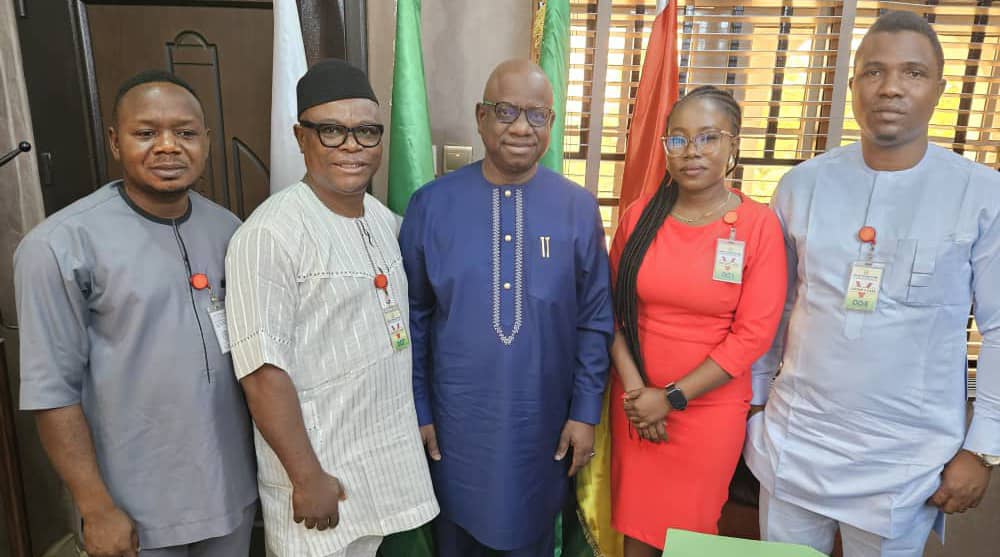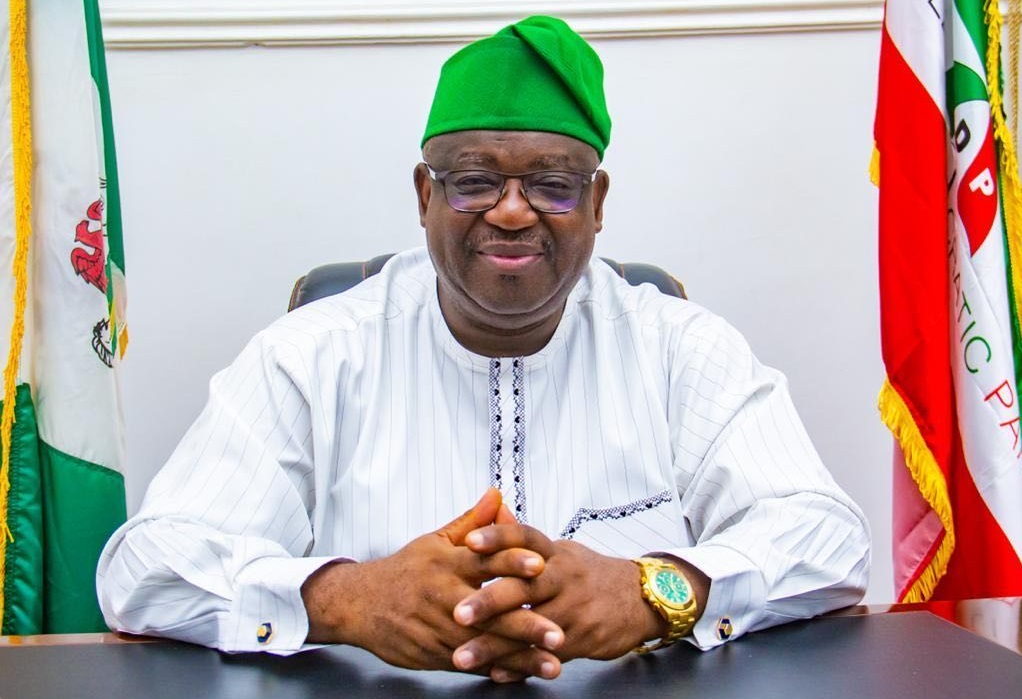News
State Governments Struggling To Pay N30,000 Minimum Wage Shouldn’t Be Allowed To Create State Police — Falana Warns

Human rights lawyer, Femi Falana, SAN, has warned the President Bola Tinubu-led Nigerian government not to allow state governments that are currently struggling to pay N30,000 minimum wage to their workers to create state police.
The renowned human rights lawyer said this on Wednesday while speaking at the maiden edition of the Yinka Odumakin Inter-faculty Debate and Public Lecture held by the Student Union of the Obafemi Awolowo University, Ile-Ife, Osun State.
Falana argued that the creation of state police is not the lasting solution to the security problems in Nigeria.
The lawyer added that the “governments should acquire the vital security equipment to track kidnappers, terrorists and the so-called unknown gunmen. Nigerians should not be deceived into believing that the establishment of state police is the panacea to insecurity in the country.”
He continued, “A state police that is not well equipped and adequately funded can never confront and contain insecurity. State governments that cannot pay the national minimum wage of N30,000 per month should discard the idea of setting up state police.
“We must avoid a situation whereby members of a state police service are owed salaries and allowances for several months. Therefore, the salaries and allowances of all security officials should be deducted from source and paid to them directly.”
“We must also realise that a well-equipped and well-funded police service cannot address the crisis of insecurity if mass unemployment of youths is not addressed.”
Falana equally berated the lack of political willingness of state governments in the country to improve basic education.
He said, “I was a member of the Alliance of Progressive Students (ALPS), a student socialist group. Yinka was also a member of the ALPS. I was the Public Relations Officer of the student union during the 1979/80 academic session.
“Yinka Odumakin held the same post in this university about 8 years later. At the material time, the Ibrahim Babangida military junta had proscribed any form of “political extremism” on the campuses. Soyinka and 7 of his colleagues were expelled for leading an anti- government protest in 1988.
“The Alao Aka-Bashorun’s Peoples’ Chambers directed me to challenge the expulsion of Yinka and his colleagues. We did and the Osun State High Court sitting at Ile-Ife ruled that the dismissal of the students infringed on their fundamental rights to fair hearing, freedom of expression and association.
“The university complied with the order but informed the military authorities in Abuja that the judgment which reinstated Yinka and his colleagues had been challenged at the Court of Appeal. Thus, they were able to graduate from this university.
“The Ife experience completely radicalised Yinka who vowed to continue to contribute his quota to the struggle for justice and fair play in the country. We worked together until we parted ways politically when he decided to pitch his tent with Afenifere.
“Notwithstanding our ideological differences, we were compelled to work together in the struggle against military dictatorship and civilian autocracy. Unfortunately, we lost Yinka to the system as he was unable to receive adequate medical treatment during the Covid 19 pandemic.
“In celebrating Yinka on this occasion, I am convinced that the student union had resolved to reconcile itself with the struggle of the Nigerian people to break with an inglorious past.
“The Child Rights Act applicable in the Federal Capital Territory has been adopted by the 36 states of the Federation. Under the law, every child is entitled to free and compulsory education from primary and junior secondary school.
“Similarly, the Free, Compulsory Universal Basic Education Fund Act guarantees the right of every child to basic education. The law mandates state governments to contribute 50 per cent of the costs of projects to be executed in their states by UBEC.”
“According to UNESCO, 20.2 million Nigerian children are out of school, the second highest rate in the world behind India.”
“As of December 11, 2023, the total amount yet to be accessed by 29 state governments was N68.7 billion while only seven state governments contributed the matching grant of N10.6 billion to access the grant for the promotion of basic education in their respective states in 2023.”
“Since appeal by parents and other stakeholders to state governments to access the fund fell on deaf ears, our law firm has filed a suit at the Federal High Court to enforce the right of every child to education in Nigeria. As a matter of urgency, on the Federal Capital Territory and the indicted 29 state governments to pay counterpart fund to access the grant.
“The Buhari administration increased the tertiary education tax from 2.5 percent to 3 percent last year. The tertiary education tax is imposed on every company at the rate approved by the President of the assessable profit for each year of assessment.
“The funds are disbursed for the general improvement of education in federal and state tertiary institutions, specifically for the provision or maintenance of essential physical infrastructure for teaching and learning; instructional material and equipment; research and publications.
“In June 2023, the Bola Tinubu administration enacted the Students Loans (Access to Higher Education) Act to create a legal framework for granting loans to indigent or low-income Nigerians to facilitate the payment of their tuition fees.
“ASUU rejected student loan scheme on the ground that it would lead to perpetual indebtedness for beneficiaries and that it would not provide universities with enough funds to function effectively.
“No doubt, ASUU’s suggestion cannot be dismissed in view of the fact that a similar loan scheme introduced by the defunct military junta in 1976 had failed.
“But NANS has arrogantly asked ASUU not to obstruct the implementation of the program, which will enable more individuals to access higher education, especially those who are financially disadvantaged.”
News
Guinea Woos Nigerian Investors to Join $20bn Projects

News
Nigeria’s inflation jumps to 24.23% in March 2025

Nigeria’s headline inflation rate rose to 24.23% in March 2025, according to the official government data source, the Nigeria Bureau of Statistics (NBS).
The rise in the country’s inflation rate, from 23.18% back in February 2025 to 24.23% in March 2025, reflected a major increase in the rising commodity and energy costs in the last few weeks.
According to the March 2025 Consumer Price Index (CPI) Report which measures the inflation rate released by the government agency on Tuesday, the country’s food inflation rate was 21.79% year-on-year in March 2025.
The food inflation rate, however, showed a decrease compared to the food inflation rate of 23.51% recorded in February 2025.
Economists had predicted that the country’s inflation rate which decreased minimally in February would rise when the Dangote Refinery and the state-run NNPCL got entangled in a petrol price war that culminated in the temporary termination of a naira-for crude agreement between the two oil companies and the subsequent increase in the pump price of petrol.
Some observers had also said the minimal reduction in the prices of food commodities experienced earlier in February was not sustainable, attributing the temporary decline in the prices of food to the importation intervention of the Federal Government.
Food and commodity inflation have skyrocketed as Nigerians battle what can pass for the worst cost of living crisis since the country’s independence over six decades ago, a development that economic wizards have attributed to President Bola Tinubu’s twin policies of petrol subsidy removal and unification of the forex rates.
News
Plateau 51: Mutfwang mourns, says “we failed you”, begs affected community

Governor Caleb Mutfwang of Plateau State has apologised to the people of Bassa Local Government Area (LGA) for the failure of government and security agencies to protect lives and properties.
Fifty-one persons were gunned down early Monday in the Zikke community of the LGA, with houses razed and many displaced about two weeks after a similar attack led to the killing of scores of persons in Bokkos Local Government Area.
Less than two days after the most recent assault, Governor Mutfwang apologised for the government’s inability to protect the people.
Fifty-one persons were gunned down early Monday in the Zikke community of the LGA, with houses razed and many displaced about two weeks after a similar attack led to the killing of scores of persons in Bokkos Local Government Area.
Less than two days after the most recent assault, Governor Mutfwang apologised for the government’s inability to protect the people.
The governor said this on Tuesday at the palace of the Paramount Ruler in Miango.
“I will tell you the truth: I have been crying since yesterday because I had trusted God that all the arrangements were put in place, that this will not happen again. We have made investments in security,” he said.
But like all human arrangements, sometimes they fail. I want to admit that on Sunday night into Monday morning, we failed you. Please, forgive me.”
He urged the people not to relent in their efforts to secure their communities and ensure that they complement security agencies’ efforts by providing vital information for intelligence gathering and expose the antics of the criminals.
Governor Mutfwang, in the company of security chiefs and members of the state executive council, was in Zikke community to commiserate with the people on the death of over fifty persons killed in Monday’s attacks.
The Paramount Ruler of Irigwe land, Ronku Aka, who is the Brangwe of Irigwe, urged the government to come to the aid of the communities with the provision of social amenities in the area.
The governor and the entourage also went to see some of the families who lost their loved ones in the attack. The victims have been buried just as members of the community demanded action to stem the rising wave of insecurity in the state.
Plateau State has been a hotbed of attacks, but the renewed spate of attacks adds a fresh layer of twist to the decades-long crisis rocking the North-Central state.
After the most recent assaults, President Bola Tinubu ordered security agencies to fish out the masterminds, describing the attacks as condemnable.
While experts have linked the lingering Plateau crisis to farmers-herders tussle for resources, Governor Muftwang said it was sponsored and genocidal.
According to him, over 64 communities in the state have been taken over by gunmen.
-

 News16 hours ago
News16 hours agoTears, anguish as Plateau Community buries 51 killed by bandits
-

 News15 hours ago
News15 hours agoSHOCKING! One month after giving birth, woman discovers another baby in her womb
-

 News13 hours ago
News13 hours agoCBEX: 60 fraudulent Ponzi scheme operators to avoid in Nigeria
-

 News15 hours ago
News15 hours agoAngry investors raid CBEX office, loot assets in Ibadan after digital Platform crash
-

 News22 hours ago
News22 hours agoPeter Obi speaks as Benue govt. blocks humanitarian visit
-

 News22 hours ago
News22 hours agoFUOYE VC suspended over sexual harassment allegations
-

 Politics15 hours ago
Politics15 hours agoIgbo Youths Set To Mobilize 5 Million Man-March In Support Of Tinubu, Kalu
-

 News15 hours ago
News15 hours ago‘Not something I’d wish on anyone’ — Melinda Gates opens up on divorce






